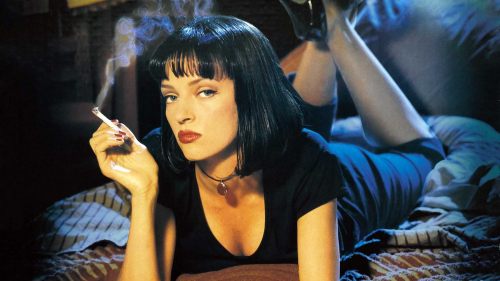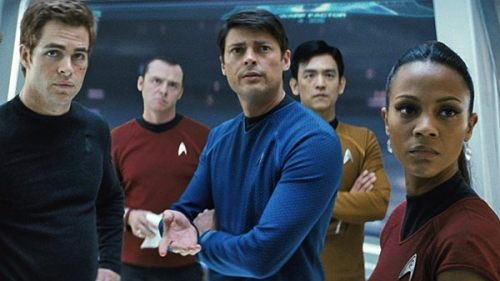PULP FICTION: TRAINSPOTTING’s Cooler, Older, American Cousin
T2: Trainspotting is on its way (some of you already have it!) Get your tickets here!
On an Edinburgh high street, a young Ewan McGregor's sneakers hit the pavement as Iggy Pop's "Lust For Life" pounds alongside him. Thousands of miles away, Sam Jackson and John Travolta cruise through LA while Kool And The Gang's "Jungle Boogie" trills on the radio. Crop tops versus sleek suits. A couple of similarly misjudged ear piercings. Jet black comedy. And habitual drug use based on status, or lack thereof.
Trainspotting and Pulp Fiction offer up two vastly different worlds, on opposite sides of the Atlantic, populated by people who have made the decision not to engage with a normal existence. Trainspotting sees McGregor's Renton and his misfit pals foregoing life in favour of heroin, while Pulp Fiction finds Jackson, Travolta and a whole host of colourful characters making the business of crime look like the coolest job prospect imaginable.
Alongside Kevin Smith's Clerks, they are widely considered the triumvirate of must-watch nineties zeitgeist movies. Although Clerks features drug use in the form of dopey dealers Jay and Silent Bob, its compatriots are two of the better drug movies ever made, wildly different and yet inescapably similar.
Tarantino's film came first, featuring drug use of the habitual variety. Travolta's Vincent Vega is shown purchasing heroin from a clean, even normal, suburban home. He shoots up only after checking it's okay with his dealer, a regular-looking dude with a browbeaten wife.
In contrast, Renton and his buddies hang out in a filthy, decrepit drug house where their dealer - a man in a leather vest who never seems to venture outside - seemingly lives alongside a baby we know is doomed the second she crawls into frame. Renton's got an addiction, for which he must lie, steal and fuck over anybody and everybody in his path.
Vincent, on the other hand, has his choice of the fancier, more expensive heroin ($500 a pop) and picks from a crisp wad of bills to pay for it. His tools, meanwhile, are housed in a clean wallet, the kind a diabetes sufferer might utilise for the administration of insulin. He uses a clean, sterile needle. Renton fishes around on the filthy floor for a halfway decent syringe, unfazed by the risk of HIV. His primary concern is getting high, while for Vince it's just part of his lifestyle, like smoking or eating steak.
Although these depictions of drug use are completely opposed, when it comes to overdosing, the two films take a surprisingly similar tack. Renton ODs on that same filthy floor, is dragged out onto the street by his nonchalant dealer and thrown into a taxi to be dropped on A&E's doorstep. Vince is tasked with taking a non-responsive Mia - who unknowingly snorted heroin - directly to his dealer, as involving hospital staff would land him in deep trouble. Both wake from their stupor in much the same way - like vampires emerging from coffins. Both share an awkward, and silent, car ride back with the people they've disappointed. Hers is a more stylised, yet gruesomer episode than his because there's little doubt Renton will survive to waste another day of his pathetic existence. Vince's life depends on Mia pulling through.
Where the two differ is in their use of music. Lou Reed's "Perfect Day" scores Renton's OD, the song now synonymous with Trainspotting as a result. Tarantino leaves his sequence without accompaniment, one of the few instances in Pulp Fiction. Instead, we get screeching tires, beating hearts and short breaths.
This is especially pertinent considering music is a character in itself in both movies, their soundtracks now considered classics. Trainspotting blasts into existence with "Lust For Life" and then ebbs away to Underworld's "Born Slippy". Pulp Fiction announces itself to the world via Dick Dale's "Misirlou" before switching the channel, as though already bored with the choice, to "Jungle Boogie". This is a trick Danny Boyle employs too, most notably with the introduction of Diane, Renton's underage paramour. He spots her in a grotty nightclub, the camera landing on her just as the song changes to Blondie's "Atomic" - a signal to the audience that she's potentially dangerous.
The narrative structure is similarly disjointed, both movies beginning towards the end of the story. Pulp Fiction is less straightforward than Trainspotting, and Tarantino waits longer to loop back around. Boyle chooses to pick up halfway through, Renton and his pals suddenly legging it down the street once more.
Both feature an underworld just below the surface of ours, the characters having little to no interaction with regular people. Both have the same wild, jittery energy, the camera gliding in and out or hanging back to listen as the characters wax lyrical. Pop culture discussions abound - McDonald's and how disgusting it is to put mayo on fries in Pulp Fiction, James Bond in Trainspotting - and both finish with one character declaring he will go straight.
In Trainspotting, drugs are all about necessity. In Pulp Fiction, they're about status. It's easy, then, to imagine the latter as the more sophisticated, older, American cousin, indulging because it can rather than because it has to.



